- Home
- Graham McNeill
Angel Exterminatus Page 7
Angel Exterminatus Read online
Page 7
The Lord of Iron counted none of his fellow primarchs as close, but the Phoenician’s adherence to perfection in all things had once provided common ground between the two super-warriors and allowed them to talk as trusted comrades-in-arms if not beloved brothers. What the Emperor’s Children had sought with constant motion towards the attainment of perfection, the Iron Warriors earned with rigid discipline and methodical planning; two divergent paths to the same ultimate goal.
Perturabo brought up a fresh set of system schematics and warp corridor overlays, together with the latest immetereological projections for the emergent storm fronts. A red planet swam into focus, its surface almost entirely englobed by metallic growths like algal blooms of shimmering steel and toxic fumes.
‘Mars?’ asked Falk, leaning his elbows on the edge of the projection table with an ease that told Forrix he should have been brought into the Trident much earlier.
‘It is, Falk, well spotted,’ said Perturabo with a knowing look at Forrix. ‘Horus will need the Martian theatre fully secured before we move against Terra, and I think Fulgrim is here to seek our aid in breaking open the forge temples. If I’m right, then I want us to have a plan in place to achieve that objective.’
‘We don’t have orders of our own?’ said Kroeger. ‘We need to wait for Fulgrim’s painted fools to tell us what to do?’
‘We had our orders,’ said Perturabo, his gravelled tones warning against pursuing any line of inquiry that led to Phall. ‘Now we await new orders from the Warmaster. Until we receive those orders, I will humour Fulgrim and listen to what he has to say.’
Kroeger nodded in understanding and folded his arms, switching his gaze to the red planet’s areography. Forrix let his eye rest a moment on Kroeger, wondering how long the primarch’s tolerance for his newest triarch’s plain speaking would last. If he didn’t last, there were others who could easily take his place. Putting Kroeger from his thoughts, Forrix switched his gaze to the highlighted quadrangles of the Martian surface: manufactories, forge-temples and fortified industrial hinterlands that yet resisted the Mechanicum forces loyal to the Warmaster.
‘They’ll be tough to break open,’ he said, studying the force disposition list and reading the contours of the fortified landscape surrounding the forges.
‘They will,’ agreed Perturabo. ‘But they’ll have to be taken sooner rather than later. The southern battle-forges of Arcadia and the Noctis Labyrinthus Line are still in enemy hands. If they’re reinforced they could threaten the supply lines from the armouries of Mondus Gamma and Mondus Occulum.’
‘You think the loyalists will try to retake the–’ began Kroeger.
Perturabo’s fist slammed down on the edge of the hololithic table, causing the veils of light representing the topography of Mars to shudder, and Kroeger flinched at the primarch’s violence, unsure as to what insult he had given.
‘Do not speak of “loyalists”,’ warned Perturabo. ‘If we call them loyalists, what does that make us? They are the enemy. In this fight there is no such thing as a loyalist or a traitor, only victor and vanquished. Remember that.’
‘I will, my lord. Apologies,’ said Kroeger.
Perturabo nodded and the tension in his body evaporated. The primarch’s anger was a volatile thing, quick to lash out, but just as quickly checked. The Lord of Iron spread the fingers of his bunched fist and, Kroeger’s error forgotten, outlined the opening moves of a campaign against the Martian forges that was as audacious as it was formidable. No sooner had he begun to describe the investment of the Tharsis uplands around the Noctis Labyrinthus than a vox-warble intruded on his words.
He stabbed the edge of the table with an impatient digit and said, ‘What?’
‘My lord, pardon the intrusion,’ said the bland tones of the Stonewrought, Soltarn Vull Bronn. ‘But the Emperor’s Children are here.’
‘I know,’ snapped Perturabo. ‘I see their ships capering in orbit.’
‘No, my lord,’ said the Stonewrought. ‘I mean they are here. On the planet’s surface. Now.’
Perturabo flinched as though struck, knowing it had been minutes only since the fleet of what had once been known as the 28th Expedition had achieved an orbit capable of launching trans-atmospheric craft.
‘Impossible,’ said Perturabo. ‘Fulgrim would never sanction a landing without hours of preparation. You must be mistaken.’
Even over the hiss and spit of the distorted vox, Forrix could hear Vull Bron’s wary hesitation at the thought of contradicting the primarch.
‘Over three hundred drop-craft have landed beyond the mouth of the valley, my lord,’ said Vull Bronn at last. ‘They bear the heraldry of the Third Legion, albeit obscured by fresh markings we cannot identify.’
‘Fulgrim is here?’ said Perturabo, as though unwilling to believe his own words.
Forrix realised his gene-father did not know his brother as well as he thought.
What other surprises might the Phoenician have in store?
FOUR
Severed
Carnivalia
Closer than Brothers
A truth that all living things must come to terms with at some point is that their life is finite, that the energy they draw from the universal reservoir will some day be taken back. It was a truth that Apothecary Fabius dismissed as a failure of imagination. Life was motive force like any other: like electricity, like warp-fire, and once absurd notions of morality and right and wrong were removed from the equation, the restoration of that motive force became simply a matter of biological engineering.
His laboratory aboard the Andronicus was a place of wonders and revelation, where the secrets of life and death, and the narrow spaces in between, were laid bare by the slice of his blade and exposed to his towering intellect. It was a labyrinthine warren of curving passageways, vaulted vivisectoria of cold iron and hermetically sealed chambers with armourglass portholes that looked into bedlams of grotesquerie.
Life had been made, reshaped and extinguished here. Experiments on living tissue, living beings and the ignoble dead had stocked the lair of Fabius with specimens of human, post-human and alien origin. Scavenging the battlefields of this newborn rebellion with his polished steel blades, he had accumulated an alchemist’s treasure trove of the macabre, the holy and the divine. Progenoids cut from the flesh of the living and the dead of Isstvan V and Prismatica had furnished Fabius with the genetic master-key to seven of the Emperor’s Legions, the code sequences that would form the basis of his ultimate revelation.
The secrets of the Emperor himself.
The cryo-frozen body before him was a distraction, but a necessary one. Its form was brutish and clumsy, but it was one Fabius had worked upon before, rewiring its synaptic receptors to create a cacophonous burst of pleasure in the subject’s mind at the merest hint of pain. The internal workings of the body were subtle and would have made a Biologis of the Mechanicum weep with a mix of admiration and horror.
Icy mists filled the surgical chamber, every last trace of warmth sucked from the space by powerful refrigeration units that chugged and growled beneath the metal flooring.
His custom-designed Chirurgeon array squatted at his shoulders like an eager observer, its grotesquely articulated arms darting around him with a mind of their own, suturing an oozing blood vessel or cauterising an open vein. Its clicking digits were more dexterous than his own hands, but there was a satisfaction in feeling the soft wet texture of an opened body beneath the haptic fingertips of his gauntlets.
Fabius wore armour contoured to his lean form, enhanced at the waist and shoulders to better support the Chirurgeon, with additional joints and custom-fabricated gauntlets that incorporated numerous tools of excruciation and healing. A long cloak of pale white hung from his shoulders, stained red with blood at its trailing edge.
Lank hair, bleached of colour and life, hung in matted ropes from his scalp, and eyes of utter blackness glittered in a face made gaunt by malnutrition and abstinence. A rasping tongue l
icked along Fabius’s lipless mouth, like a lizard tasting the air.
‘Are you not finished yet?’ said a voice from the far side of the laboratory, but Fabius did not turn from his work. ‘The Legion will be assembling for the drop to the planet’s surface.’
‘They have already left,’ said Fabius. ‘The Phoenician and his flawless host will soon be guests of the Lord of Iron.’
‘I should be with them! You promised I would be with them!’
Fabius shrugged. ‘More pressing matters arose,’ he said. ‘Be glad I attend to you at all. Had the decision been mine, I would have left you to die.’
‘I did die.’
Fabius waved away the semantics. ‘Life, death. Words. Life is a purely mechanistic process, the body a machine that can be restarted when the motive force behind it fails.’
‘Easy for you to say, Apothecary, you’re not the one that’s dead.’
‘And neither are you, though if you persist in distracting me, I may oblige you.’
‘The primarch would kill you.’
‘Oh, ironic fate that we should both perish by the same blade…’ laughed Fabius.
The voice fell silent, which surprised Fabius, but it gave him a chance to continue his work in peace. The cut was a clean one, the blow struck with enough force and by a sharp enough blade that there was virtually no tissue damage beyond the exact point of impact. It was a killing blow of perfect precision, one that only a primarch was capable of delivering.
‘What is taking so long anyway?’ said the voice, and Fabius ground his teeth at the tonal implications of his tardiness. ‘You are supposed to be the best, or was that another of your hollow boasts?’
Fabius bit back a caustic response and resisted the urge to wreak some spiteful harm on the body before him. Instead, he said, ‘The nerve clusters at the base of the neck have been severed completely, and, trust me, the consequences of them being reconnected wrongly would not be pleasant.’
‘I can live with pain.’
‘And you will,’ promised Fabius. ‘The greatest of pain. You will know pain like no other, and it will drive you mad with joy. Every instant of life I give you will be spent in a symphony of pain and pleasure. You will hate me and worship me in equal measure, I think.’
‘You should know that I have always hated you, Fabius.’
Fabius turned to address the speaker and grinned, the expression like that of a lecherous skull taking great pleasure in knowing that the living would soon be its kin.
‘You waste your hate on me,’ said Fabius. ‘I do not take enough notice of your existence for it to be anything other than an irrelevance. Loftier matters demand my attention, not this patchwork abomination of flesh.’
‘I think I will kill you some day.’
‘You will not,’ said Fabius.
‘You are arrogant.’
‘And you are a fool. Think of all the sensation that might yet be yours, the cravings of flesh and blood yet to be satisfied. Imagine the glories you will forgo by antagonising me and causing me to kill you.’
‘The primarch himself ordered you to restore me,’ said the voice, almost pleading.
‘A moment of misplaced remorse,’ said Fabius, bending back to his task as the Chirurgeon clicked impatiently. ‘One he probably already regrets. No, my friend, be assured that if you die down here you will not be missed. Already your fellow captains jostle and scheme to assume your mantle…’
‘I will return stronger and more powerful than ever before!’
‘That you will,’ agreed Fabius, turning back to the voice. ‘Now be silent and let me work.’
On the far side of the shadowed laboratory, a severed head sat atop a crown of surgical spikes, tube feeds, blood pumps, electro-cortical stimulators and coolant coils that kept the brain within from death.
Head and body belonged together, but had been shorn by a single blow from Fulgrim’s golden-bladed sword.
The severed head watched Fabius at work on his dead body and plotted on the many ways he wanted him to suffer.
Somewhere around the hardpan of the Emperor’s Children dropsite three kilometres beyond the valley mouth, a riot had collided with a triumphal parade. That could be the only possible explanation for the gaudy cavalcade of noise, colour and spectacle that processed into the valley. Ten thousand mortals provided a vanguard for the III Legion, a frantic host of screaming men and women, swirling banners and discordant noise blasting from instruments that bore no relation to anything crafted by a sane musician.
Blooms of coloured and perfumed smoke wafted ahead of the host, fanned by glassy-eyed ogryns whose contoured body-armour had been hammered to their flesh by barbed spikes. Forrix watched with a mixture of anger and horror at the sight of the approaching rabble, a decadent celebration of every perversity and degradation known to man.
The senior officers of the Iron Warriors had assembled at the towering barbican of the southern contravallation to greet the Phoenician and his Lord Commanders, and this was how they were met? With carnivalia and lunacy? Forrix glanced towards Perturabo for some sign of how this insulting display had skewed his humours, but the primarch’s expression was as impermeable as the hardest rock, as expressionless as the mechanical warriors of the Iron Circle arranged in an arc behind him. Forrix stood at the right hand of Perturabo, his heavy plate gleaming despite the meagre time that his armoury serfs had had to prepare him. Barely had Vull Bronn given his warning of the III Legion’s arrival than the primarch had led them from the Cavea Ferrum and summoned his Legion. A hundred and two Land Raiders chevroned in gold and jet growled at their backs, alongside heavy artillery pieces with their elongated bronze barrels raised to the heavens in salute. Ranks of smaller crew-served weapons were arrayed in honour of this meeting of demigods, their gunners resplendent in the bronze cloaks of the Stor-bezashk.
In the shadow of the monolithic walls, battalions of the Thorakitai stood ranked in their tens of thousands, shuffling and jostling as their discipline master’s electro-goads whipped them into formation. Before them stood two hundred Grand Battalions of Iron Warriors, fifty thousand warriors in amberdust-burnished warplate, like the ranked-up statues of a heathen king afraid to meet the souls his armies had consigned to the afterlife.
Such a display of might and magnificence had not been seen since the slaughter unleashed upon the black sands of Isstvan. It was a host to conquer the stars and remake the galaxy, the likes of which would one day shake the very foundations of the Imperial Palace on Terra.
And this was but one of the Warmaster’s armies.
The Stonewrought stood beside Forrix, and he took a moment to admire the iron-bladed entrenching tool slung across the warrior’s back. As much a weapon as a tool for breaking ground, it was a masterfully crafted implement. The edge was hard and given a subtle bevel that would bite earth and flesh with the greatest of ease.
Soltarn Vull Bronn was a shaven-headed lieutenant of the 45th Grand Battalion, with thin eyes and skin that was pale in the face, leather-brown at the neck from staring so long at the ground. Forrix had watched Vull Bronn lay his hands upon the rock of a dozen planets and, through some unknowable geological communion, learn its secret vulnerabilities, its strengths and its weaknesses. Where it would most readily break open and where it would resist every pick, drill and explosive.
The skin of a world spoke to him, and that alone was worth the price of his dull company.
Barban Falk, towering and absurdly solid, stood at Perturabo’s left hand. Only a head shorter than the Lord of Iron, he was nevertheless made small by the primarch, who imprinted his presence on the face of the world like a statement.
The Legion’s newest triarch took his place at Falk’s side, his armour still battered from the assault over the walls of the citadel. The ceramite of Kroeger’s plate had been cleaned of blood, and the unsullied suit made him look somehow less than Forrix knew he could be.
Toramino stood behind Forrix, and the master of the Stor-bezashk made no
attempt to hide his disdain for Kroeger and the rank to which he had been elevated. As much as Forrix enjoyed Toramino’s displeasure, he had a nagging suspicion that this insult to the warsmith’s pride would not be forgotten or forgiven.
Behind the primarch stood the mighty form of Berossus, restored to the Iron Warriors through the genius of the Techmarine at his side. The iron and adamantium sarcophagus at the heart of his Dreadnought body was a funerary casket of machine-stamped skulls and exhumed bones, the siege hammer and rotary cannon his instruments of death. Oil drizzled from his armoured flanks and his augmitters growled with low-level static burrs like grinding metal. Twin lengths of chain hung from Berossus’s back, and fettered at their ends were two bloodied figures, one encased in a full-body splint cage, the other clad in the fragmented remains of the dusty gold armour of the Imperial Fists.
The forward elements of the capering host were drawing near, and coils of hallucinogenic fog writhed between the legs of the riotous assembly. It moved with a life of its own, eager to explore its creators’ bodies and taste their sweat, their breath and their dirt. The screams that reached to the skies were delirious and joyous, agonised and ecstatic, a braying wall of sound that echoed from the sides of the valley like the ravings of a million madmen.
Scarifier priests spun and leapt throughout the dancing horde, their hooked chains and envenomed blades whipping and stabbing with gleeful abandon to cause pain and excruciation. Where their poisoned tips pierced an artery, the grateful victim would be seized by mad choreomaniacal fits. Roaring observers aped their lethal convulsions and the dancing mania spread ever wider, becoming more and more elaborate until the original victim’s madly pumping heart emptied their body of blood and a new dance began elsewhere.
Mass psychogenic hysteria gripped the thousands of men and women, who screamed and laughed and cried like mourners or celebrants. They fought, they fornicated; moving to the rapid, pulsing beat of a driving imperative that none among the Iron Warriors could know. They carried towering banners, streaming gonfalons and serrated pennants ablaze with imagery that was at once obscene and alluring, repugnant and inviting.

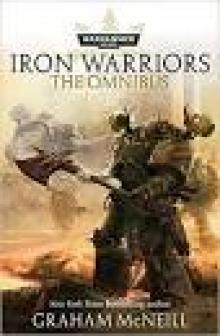 Iron Warriors - The Omnibus
Iron Warriors - The Omnibus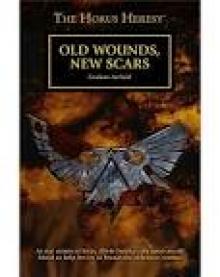 Old Wounds, New Scars
Old Wounds, New Scars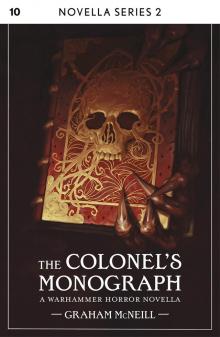 The Colonel's Monograph
The Colonel's Monograph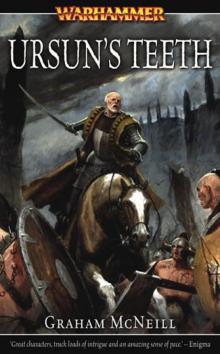 Ursuns Teeth
Ursuns Teeth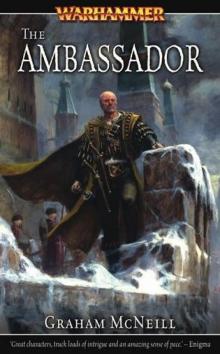 The Ambassador
The Ambassador![[Ultramarines 5] Courage and Honour - Graham McNeill Read online](http://i1.bookreadfree.com/i/03/12/[ultramarines_5]_courage_and_honour_-_graham_mcneill_preview.jpg) [Ultramarines 5] Courage and Honour - Graham McNeill
[Ultramarines 5] Courage and Honour - Graham McNeill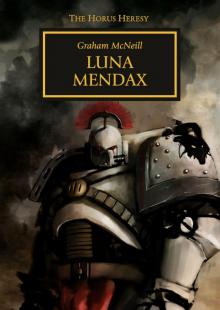 28a Luna Mendax
28a Luna Mendax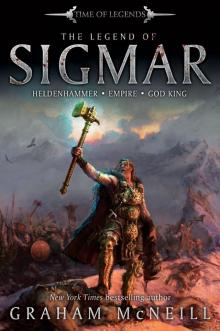 The Legend of Sigmar
The Legend of Sigmar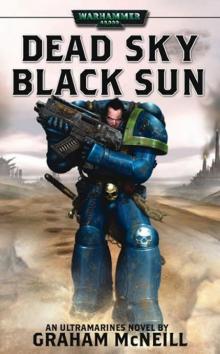 Warhammer - Ultramarines 03 - Dead Sky, Black Sun (McNeill, Graham)
Warhammer - Ultramarines 03 - Dead Sky, Black Sun (McNeill, Graham)![Warhammer - [The Ambassador Chronicles 01] - The Ambassador Read online](http://i1.bookreadfree.com/i/03/17/warhammer_-_[the_ambassador_chronicles_01]_-_the_ambassador_preview.jpg) Warhammer - [The Ambassador Chronicles 01] - The Ambassador
Warhammer - [The Ambassador Chronicles 01] - The Ambassador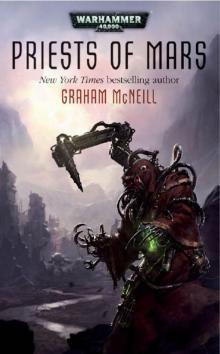 Priests of Mars
Priests of Mars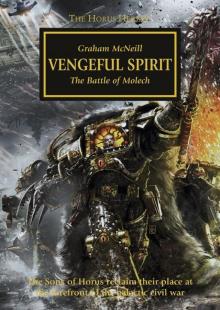 Vengeful Spirit
Vengeful Spirit![[Sigmar 03] - God King Read online](http://i1.bookreadfree.com/i/03/13/[sigmar_03]_-_god_king_preview.jpg) [Sigmar 03] - God King
[Sigmar 03] - God King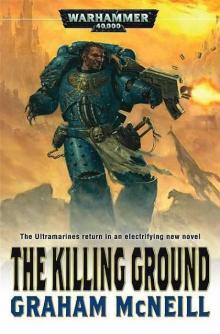 The Killing Ground
The Killing Ground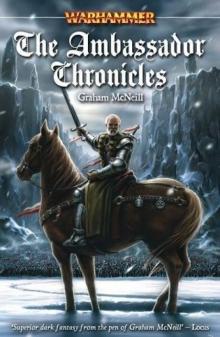 The Ambassador Chronicles
The Ambassador Chronicles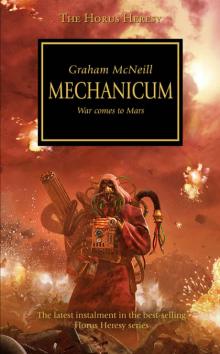 Mechanicum
Mechanicum![[Ulthuan 02] - Sons of Ellyrion Read online](http://i1.bookreadfree.com/i/03/14/[ulthuan_02]_-_sons_of_ellyrion_preview.jpg) [Ulthuan 02] - Sons of Ellyrion
[Ulthuan 02] - Sons of Ellyrion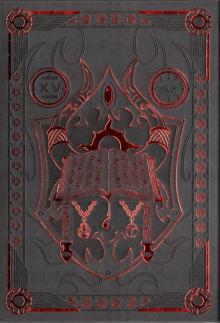 Magnus the Red: Master of Prospero
Magnus the Red: Master of Prospero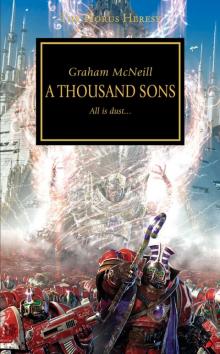 A Thousand Sons
A Thousand Sons![[Warhammer] - Guardians of the Forest Read online](http://i1.bookreadfree.com/i/03/18/[warhammer]_-_guardians_of_the_forest_preview.jpg) [Warhammer] - Guardians of the Forest
[Warhammer] - Guardians of the Forest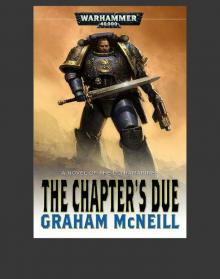 The Chapters Due
The Chapters Due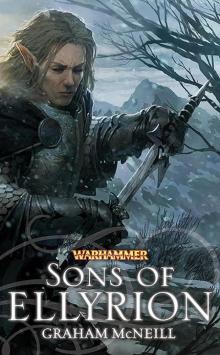 02 - Sons of Ellyrion
02 - Sons of Ellyrion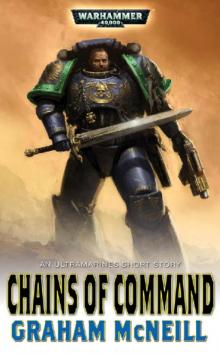 Chains Of Command
Chains Of Command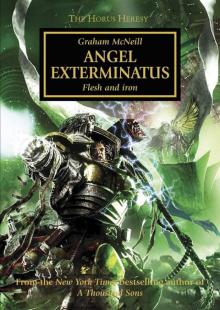 Angel Exterminatus
Angel Exterminatus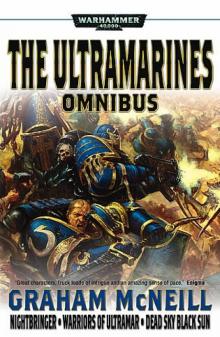 The Ultramarines Omnibus
The Ultramarines Omnibus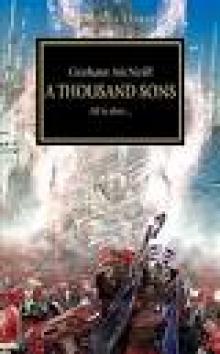 X Marks da Spot
X Marks da Spot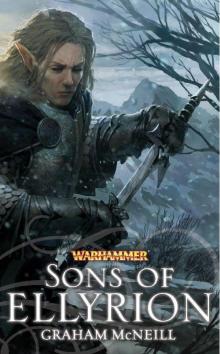 Sons of Ellyrion
Sons of Ellyrion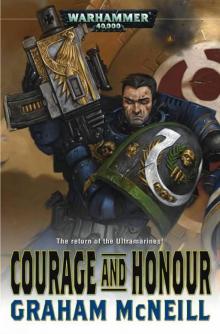 Courage And Honour
Courage And Honour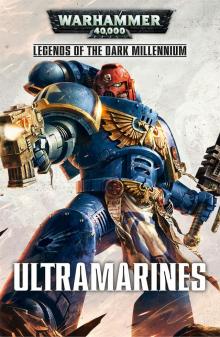 Ultramarines
Ultramarines![[Ulthuan 01] - Defenders of Ulthuan Read online](http://i1.bookreadfree.com/i/03/16/[ulthuan_01]_-_defenders_of_ulthuan_preview.jpg) [Ulthuan 01] - Defenders of Ulthuan
[Ulthuan 01] - Defenders of Ulthuan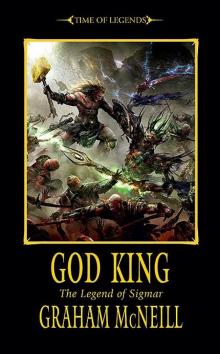 03 - God King
03 - God King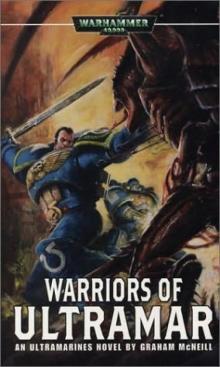 Warhammer - Ultramarines 02 - Warriors Of Ultramar (McNeill, Graham)
Warhammer - Ultramarines 02 - Warriors Of Ultramar (McNeill, Graham)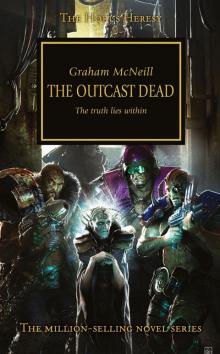 The Outcast Dead
The Outcast Dead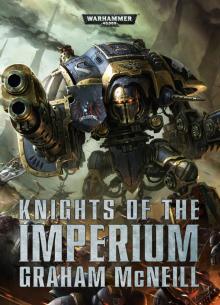 Knights of the Imperium
Knights of the Imperium Defenders of Ulthuan
Defenders of Ulthuan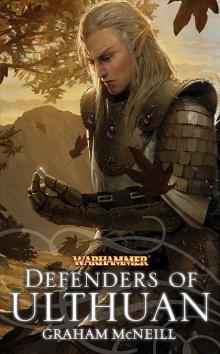 01 - Defenders of Ulthuan
01 - Defenders of Ulthuan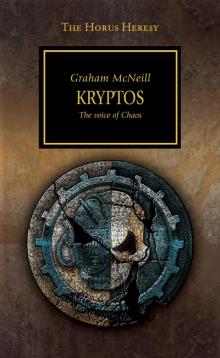 Kryptos
Kryptos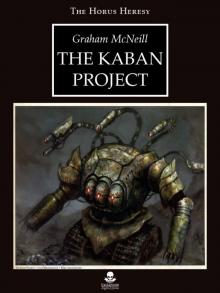 The Kaban Project
The Kaban Project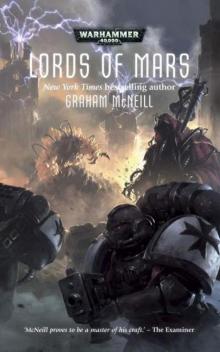 Lords of Mars
Lords of Mars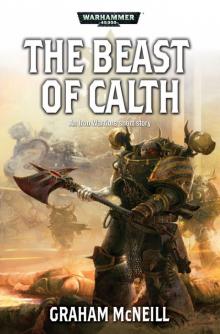 The Beast of Calth
The Beast of Calth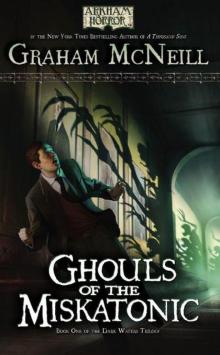 Ghouls of the Miskatonic (The Dark Waters Trilogy)
Ghouls of the Miskatonic (The Dark Waters Trilogy)![[Sigmar 01] - Heldenhammer Read online](http://i1.bookreadfree.com/i/03/24/[sigmar_01]_-_heldenhammer_preview.jpg) [Sigmar 01] - Heldenhammer
[Sigmar 01] - Heldenhammer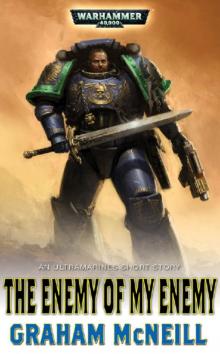 The Enemy Of My Enemy
The Enemy Of My Enemy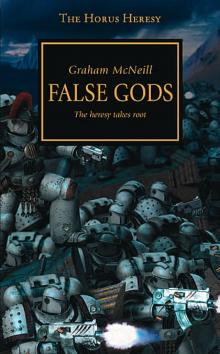 False Gods
False Gods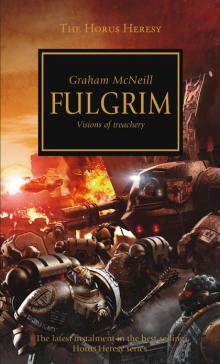 Fulgrim
Fulgrim Mechanicum whh-9
Mechanicum whh-9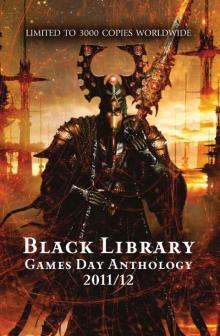 Death of a Silversmith
Death of a Silversmith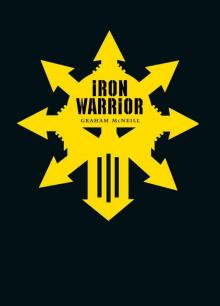 Iron Warrior
Iron Warrior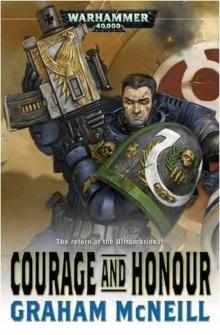 Courage and Honour w4u-5
Courage and Honour w4u-5![[Ultramarines 6] Chapters Due - Graham McNeill Read online](http://i1.bookreadfree.com/i1/03/30/[ultramarines_6]_chapters_due_-_graham_mcneill_preview.jpg) [Ultramarines 6] Chapters Due - Graham McNeill
[Ultramarines 6] Chapters Due - Graham McNeill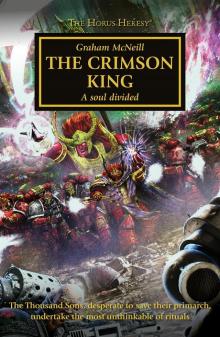 The Crimson King
The Crimson King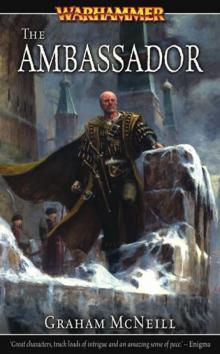 1 the ambassador
1 the ambassador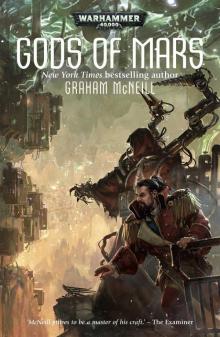 Gods of Mars
Gods of Mars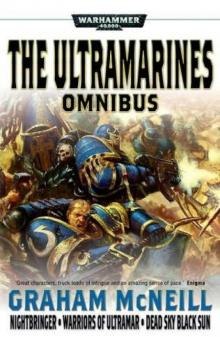 Ultramarines Omnibus (warhammer 40000: ultramarines)
Ultramarines Omnibus (warhammer 40000: ultramarines)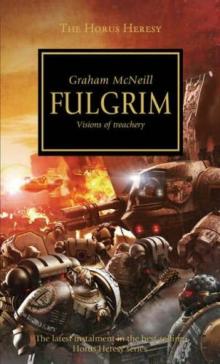 Fulgrim: Visions of Treachery whh-5
Fulgrim: Visions of Treachery whh-5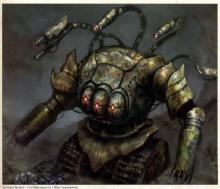 The Kaban Project (warhammer 40000: horus heresy)
The Kaban Project (warhammer 40000: horus heresy)![[Sigmar 02] - Empire Read online](http://i1.bookreadfree.com/i1/04/05/[sigmar_02]_-_empire_preview.jpg) [Sigmar 02] - Empire
[Sigmar 02] - Empire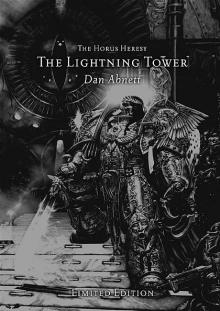 The Lightning Tower & The Dark King
The Lightning Tower & The Dark King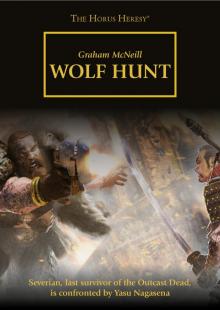 Wolf Hunt
Wolf Hunt Killing Ground w4u-4
Killing Ground w4u-4![Warhammer - [The Ambassador Chronicles 02] - Ursun's Teeth Read online](http://i1.bookreadfree.com/i1/04/05/warhammer_-_[the_ambassador_chronicles_02]_-_ursuns_teeth_preview.jpg) Warhammer - [The Ambassador Chronicles 02] - Ursun's Teeth
Warhammer - [The Ambassador Chronicles 02] - Ursun's Teeth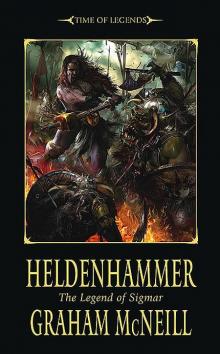 01 - Heldenhammer
01 - Heldenhammer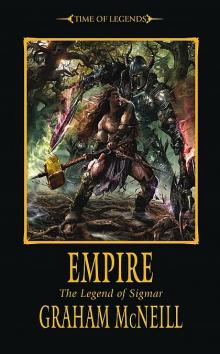 02 - Empire
02 - Empire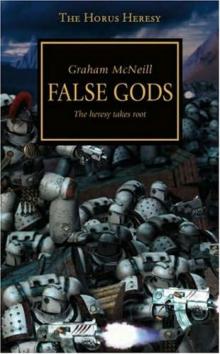 False Gods whh-2
False Gods whh-2